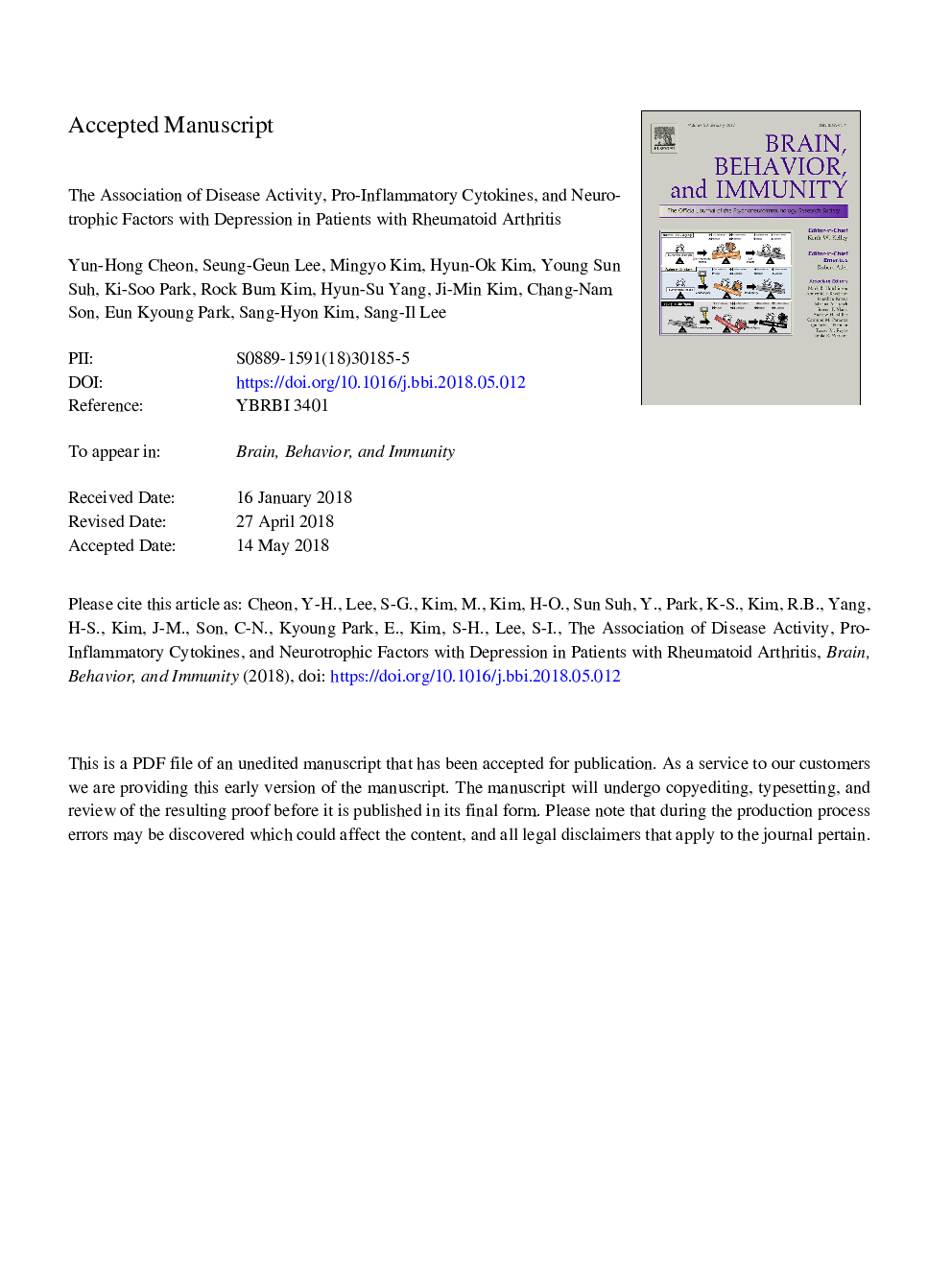| کد مقاله | کد نشریه | سال انتشار | مقاله انگلیسی | نسخه تمام متن |
|---|---|---|---|---|
| 8960740 | 1646430 | 2018 | 40 صفحه PDF | دانلود رایگان |
عنوان انگلیسی مقاله ISI
The association of disease activity, pro-inflammatory cytokines, and neurotrophic factors with depression in patients with rheumatoid arthritis
ترجمه فارسی عنوان
ارتباط فعالیت بیماری، سیتوکین های پروتئین التهابی و عوامل نوروتروفیک با افسردگی در بیماران مبتلا به آرتریت روماتوئید
دانلود مقاله + سفارش ترجمه
دانلود مقاله ISI انگلیسی
رایگان برای ایرانیان
کلمات کلیدی
موضوعات مرتبط
علوم زیستی و بیوفناوری
ایمنی شناسی و میکروب شناسی
ایمونولوژی
چکیده انگلیسی
Inflammation and trophic factors (brain-derived neurotrophic factor [BDNF], vascular endothelial growth factor, glial cell line-derived neurotrophic factor, and insulin-like growth factor-1) are associated with depression in the general population. Rheumatoid arthritis (RA) is a chronic representative inflammatory autoimmune disease; however, the association of disease activity, pro-inflammatory cytokines, and neurotrophic factors with depression has not been sufficiently investigated. Therefore, we determined the prevalence of depression and risk factors for depression and deterioration of depressive symptoms in RA patients. In addition, we analyzed the association between disease activity, pro-inflammatory cytokines, trophic factors, and depression in RA (Nâ¯=â¯474). Demographic and laboratory data were examined, and routine assessment of patient index data 3 (RAPID 3) and disease activity score 28-joint count C-reactive protein (DAS 28-CRP) was performed to assess disease activity of RA. Depression was measured using the Korean version of the Beck Depression Inventory-second edition (K-BDI II). A K-BDI score â¥18 was considered the cut-off for depression in accordance with a previous validation study. The serum level of pro-inflammatory cytokines and neurotrophic factors was assessed by enzyme-linked immune sorbent assay. The prevalence of depression was 32.4% in patients with RA. The severity of disease activity of RA (RAPID 3 score [OR 2.34; 95% confidence interval, CI 1.22-4.51], DAS 28-CRP [â¥3.2] [OR 1.60, 95% CI 1.01-2.53]) and severity of fatigue (OR 1.26 95% CI 1.15-1.38) were associated with depression and deterioration of depressive symptoms in the multivariate analysis. Among the components of RAPID 3 and DAS 28-CRP, patient assessment for global health and abilities for daily performance were more related to depression. The level of pro-inflammatory cytokines (IL-1β, IL-6, TNF-alpha) was not related to depression. The level of BDNF was significantly lower in RA patients with depression and was negatively correlated with K-BDI II score. Depression was related with the level of fatigue, low expression of BDNF, and high RA disease activity, which was associated with impaired ability to perform activities of daily life. Strict control of fatigue and disease activity to improve one's capacity to perform daily life activities would be important to regulate depression. The level of BDNF might be one of the possible biomarkers to predict or monitor depression in patients with RA.
ناشر
Database: Elsevier - ScienceDirect (ساینس دایرکت)
Journal: Brain, Behavior, and Immunity - Volume 73, October 2018, Pages 274-281
Journal: Brain, Behavior, and Immunity - Volume 73, October 2018, Pages 274-281
نویسندگان
Yun-Hong Cheon, Seung-Geun Lee, Mingyo Kim, Hyun-Ok Kim, Young Sun Suh, Ki-Soo Park, Rock Bum Kim, Hyun-Su Yang, Ji-Min Kim, Chang-Nam Son, Eun Kyoung Park, Sang-Hyon Kim, Sang-Il Lee,
